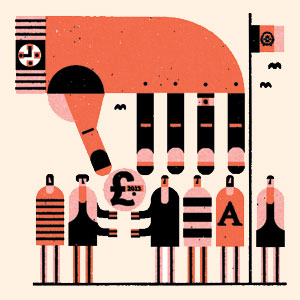The Undercover Economist: How to give money away

Roula Khalaf, Editor of the FT, selects her favourite stories in this weekly newsletter.
What should the comfortably off of the world do to help the poor? We could build dams, railways and roads. We could fund education or public health. We could lower our tariffs and let them sell things to us. We could advise them on appropriate economic policies. (I know, I know.) Or we could leave them alone, on the grounds that our help may be doing more harm than good.
But here’s an alternative: why don’t we just give them money? For such a forehead-slappingly obvious plan, it’s received relatively little attention until the past few years. Until recently it has been hard to reach the very poor directly. Making sure that welfare payments go to all and only the right people is hard enough in the UK – it stands to reason that it will be a lot more difficult in Afghanistan.
So far we’ve settled for giving the money to the governments of poor countries instead, often with strings attached aimed at making sure the money is spent on good works. But those strings can be snipped. You may think you’re paying for a hospital, but if the health minister simply uses your aid money to build a hospital he would have built anyway, and steals the money from his own budget, you’re really just paying for his luxury apartment in Monaco.
Yet now we can simply stuff cash into the virtual pockets of the poor. Many very poor people have mobile phones, or access to phones. The government of India has embarked on a vast project to give everyone an ID number. GiveDirectly is a charity that passes donations straight to poor families in Kenya, using the well-established phone-banking system, M-Pesa.
But are direct cash transfers desirable? They may well be. The very deprivation that seems to make direct cash transfers challenging may actually simplify matters. To take the example of, say, Malawi: more than eight in 10 people there earn less than two dollars a day, even after adjusting for the lower cost of living in Malawi. If you give $50 to everyone in the country, and a few rich people are among those who benefit, what harm? And while reasonable people can argue about why poor people in Bristol or Barnsley are poor, there’s no doubt about why poor people in Malawi are poor: it’s because they live in Malawi. Given an extra dollar, the chance that they find some good use for the money seems high.
A number of studies have found that when poor entrepreneurs are given cash grants, they manage to achieve a high rate of return – a typical figure being 40 to 80 per cent a year. A new randomised trial has now been carried out in Uganda, which goes even further, giving cash to young rural people with no particular trade at all.
The study, now a working paper by Chris Blattman, Nathan Fiala and Sebastian Martinez, examined what happened when the Ugandan government handed out $10,000 to groups of young people, selected randomly. Per person, these grants were around twice the annual income of the young people in question. Blattman and his colleagues then looked at what happened over the subsequent four years, compared with the control group. Did they just spend the cash, or did they find a way to invest it?
The results were encouraging: these young people often set themselves up in a new, skilled trade such as carpentry or hairdressing. Earnings rose sharply. The returns were particularly high for young women relative to their cash-constrained comparison group. And as Blattman points out on his blog, this isn’t just about helping a few poor people: it’s about funding a process of industrial transformation, shifting from rural labouring to skilled crafts, one grant recipient at a time. Helping the poor in the most obvious way of all is starting to look attractive.
——————————————-
Tim Harford is the presenter of Radio 4’s “More or Less”.
Twitter @timharford.
To comment, email magazineletters@ft.com
Comments